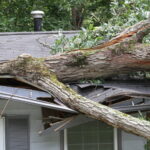Docks are an investment.
This investment can be exciting but also overwhelming. Docks are subjected to many forces that can threaten and wear them down faster and more significantly compared to other structures you may choose to add to your home.
A dock is a big investment that can be a little scary for a homeowner. It’s obvious this investment will go to waste if not managed with care, diligence, and respect. Perhaps the most important thing you can do to ensure this investment is guarded as well as possible – aside from choosing the best materials and dock builder for your project – is to understand, discover, and deploy dock protection concepts and products.
The Different Things That Can Damage a Dock
WEATHER AND NATURAL DECAY
It is clear that normal weather conditions can affect the lifespan of a dock. It can first affect the dock’s components, including the screws, piers, anchoring, flooring, and roof (if applicable). Other types of corrosion, such as erosion and rust, can also be a problem. “Big storms” can be very damaging to coastal areas, including docks.
It’s important to remember that “plain old” decay can also occur, and this is the standard decay of many materials used for dock construction, including dock posts and piers.
WATER & MARINE BIOLOGY
Water in general can contribute to the degradation of dock pilings and piers. Concrete pilings have limited resistance. Concrete piers are not suitable for all docks and are especially impractical for residential docks.
Also, marine life, such as plankton and crustaceans that cling to wood piers, should be considered. While these “living” creatures don’t usually harm dock posts and piers (and can even make them stronger), they are a danger for boats and people that might accidentally brush against them.
PEOPLE AND THINGS
Docks are designed to be used, so they will also be subjected to some abuse. It could mean that the dock is kicked, broken, and nicked over the years or bumped by boats and other PWCs. All of these can result in immediate damage or damage that accumulates over time.
It may seem like all is gloom and doom, but that’s simply not the case. Docks are a lot of fun, and this is one reason why people build them. As with everything, the key is to be proactive in preventing potential risks and damage. The more you invest in your dock, the longer and cheaper it will be to enjoy.
How can you protect your dock from damage?
Here are some additional protections that you can add to your dock to keep it safe and prolong its life:
- Upgraded Dock Bushings
- Additional or enhanced bracing for docks with roofs
- Upgraded dock anchoring
- Dock rails and railing
- Dock bumpers
- Dock piers and piling protection
Dock bumpers, dock piers, and piling protection are two of the most cost-effective options that can be added. Dock bumpers protect your dock against people and other objects.
Piling protection will help your dock last longer.
Piers or pilings, like the foundation for a home, are the foundation for your dock. It’s important to factor in pier protection when planning your dock so that you can protect your dock piers from the start. Pier and piling protection is a little more expensive, but you will save money over time.
If you have already constructed your dock or deck, pilings and piers can still be protected. This extra layer of protection can be added at any time to protect your dock posts, piles, and dock piers from further damage and erosion. It’s important to protect dock pilings and ensure the longevity and safety of your dock.
Beach to Bay Dive Services started in early 2019 as a commercial dive service. Our team continues to provide our customers with peace of mind knowing that each project will be performed correctly from conception to completion at a fair cost. Our reputation has been and continues to be our best advertisement. Recently, Beach to Bay Dive Services has transitioned to Beach to Bay Divers and Pools. Our experienced pool technicians provide a level of service and repairs that assure our pool customers have the same peace of mind as our dive service.










